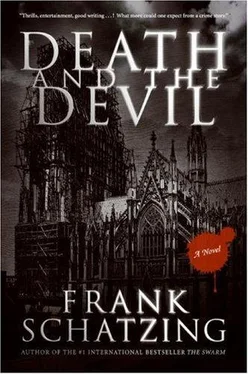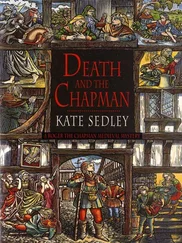“War, Fox-cub. The thing that kills us at the moment when we kill. Urquhart was duke of Monadhliath in Scotland. His castle rises above Loch Ness. But he was not one of those clan chiefs who was a crude butcher. He had been to Paris and well taught there. Hieronymus described him as a man both noble and bold. Quick to take up his sword, but just as quick with words. A man who loved duels, but not slaughter. Among the nobles who led the Crusade, he was counted as one of the most honorable, although like so many he had succumbed to the mistaken belief that God’s seed can flourish in blood-soaked soil. Then Louis’s troops captured Damietta. And something happened he could not understand. Slaughter. Louis had hundreds of children herded together to demonstrate once and for all what he thought of the infidel. They were tortured and butchered, so that many of the men, even the toughest and cruelest among them, turned away in horror.”
Jaspar sighed.
“The mighty ignore condemnations of war with contempt, intellectuals with a shrug of the shoulders, because they say nothing new or original. But they will remain true as long as we continue to wage war. We will have dominion over the whole of creation in a way God never dreamed of. We will not be dwarves on the shoulders of giants, but a race of giants, each outgrowing the other much too quickly—but when it comes to the crunch, we’ll still smash one another’s skulls in as in the darkest of dark ages. When they slaughtered the children in Damietta, something changed inside Urquhart. War has more subtle methods of destroying people than just killing them. He fell into a fit of demented rage. And his heart began to freeze to ice. Eventually they were all afraid of him, even Louis. He sent a dozen of his best men to Urquhart’s tent. They crept in at night to kill him while he slept.”
“What happened?”
“Only one came out. Crawled out on his belly. His last words were that it wasn’t a man they’d found in the tent, but a beast, and that beast had been the Devil. The next morning Urquhart was gone. He had run away, just like you. From himself, from what could not be altered. And unlike you, who eventually managed to come to terms with it, Urquhart gave himself up to the dark side. The evil, that he believed he was fighting against, became his nature. Urquhart no longer recognized himself, otherwise he would have realized that one can always turn back.”
For a while Jacob said nothing. Then, “No,” he said, “I don’t think he could turn back.”
“But you did.”
“I had help.”
“Hmm.” Jaspar massaged the bridge of his nose. For a long time there was silence.
“What are you going to do now?” he eventually asked.
“Don’t know. Think. Play my whistle. Not run away, that’s for sure.”
“Very worthy. Now I’m not trying to talk you into anything you don’t want, but—well, as far as dyeing’s concerned, Goddert will have to call it a day, and Richmodis—well, I think I can say she quite likes you…”
“I more than quite like Richmodis.”
“Well, there you are!” Jaspar slapped the stone parapet. “What are we waiting for?”
“Jaspar.” Jacob shook his head and smiled for the first time. “You can run away by staying where you are. I need to be alone with myself for a while. It isn’t all over for me yet. What I mean is, saying Urquhart’s dead and the alliance dissolved is not the end of the story. I’m still the man who looked away too quickly. Once. Give me time.”
Jaspar looked at him for a long time. “Will you go away?”
Jacob shrugged his shoulders. “Perhaps. In a way we were similar. Urquhart no longer knew who he was, and I’ve been running away for so long that over the years I’ve lost myself. Do you think Richmodis could be happy with a man who doesn’t know who he is?”
Jaspar thought about it. “No,” he admitted quietly. Suddenly he felt sad. And at the same time a little proud of his Fox.
The sky was turning pink. A flight of swallows skimmed over their heads. Soon they would be gone, too.
“But if you go searching—”
Jacob looked at him.
“—and find what you’re looking for—” Jaspar spread his arms wide. “I mean, you have a choice.”
Jacob nodded. “Abelard,” he said, smiling.
Jaspar’s grin was broad. Dammit, another reason to be proud.
“Yes,” he said. “Abelard.”
C onrad von Hochstaden died on 28 September 1261, without having pardoned the imprisoned patricians. All pleas were in vain. Whether there were further plans to assassinate him is not known. What is known is that he reestablished—for one last time—the power of the archbishops of Cologne. He was buried first of all in the old cathedral, then in the axial chapel of the new cathedral. Today his tomb is in the chapel of St. John, while the axial chapel is devoted to the memory of the Three Kings—and, in a way, to Gerhard, the cathedral’s first architect. If you look up along the arch to the point of the center window, you will see a carved head with long, curly hair and an open mouth, as if he were still calling out his instructions to the stonemasons. Whether it is the place where Gerhard fell to his death and whether it is actually a portrait of him has never been established for certain.
Conrad’s successor, Engelbert von Falkenburg, dashed the patricians’ hopes of release so that they took the matter into their own hands and escaped. Following some large-scale horse-trading, the patricians were supposed to be allowed to return, for which Engelbert was to receive 1,500 marks. At the same time the number of complaints of corruption and excess against the new council of magistrates increased. Engelbert, however, did not keep his promise to reinstate the patricians in the city administration; instead he ruled as a tyrant and had Bayen Tower and Kunibert Tower converted into real fortresses. As a consequence, the patricians, guilds, and citizens banded together again and war broke out. Engelbert besieged the city, but without success. The bishop of Liège and the count of Geldern came to resolve the conflict, at the end of which Engelbert was compelled to recognize, as had Conrad before him, the Great Adjudication of 1258, and the patricians and former magistrates finally returned.
Engelbert’s power had gone. He could not even stop himself from being imprisoned for twenty days by the citizens for supposedly hatching an armed plot against the patricians. The pope, Urban IV, more and more concerned by the city’s efforts to achieve independence, attempted to intervene several times, despite his low opinion of Engelbert. The latter tried everything, including stirring up the guilds, who were defeated by the patricians in a bloody conflict. At last the ensuing arbitration made the patricians go barefoot to beg the archbishop’s forgiveness once again. Under Conrad that had been the beginning of a nightmare for them; under Engelbert it led to farce. The archbishop again tried to subdue Cologne by force of arms and instigated an intrigue that was a complete failure, compelling him to flee to Bonn. There was the usual reconciliation, but while outwardly Engelbert was all sweetness and light, in secret he was stirring up the old antipathies between the noble families, inciting the Weises against the Overstolzes. At the last moment open conflict was avoided through the mediation of Count William of Jülich, the old enemy of Conrad and of the archbishops in general. Engelbert then took up arms against William, devastated his territory, and spent the next three and a half years imprisoned in Jülich.
In the meantime William’s efforts were proving vain—the Weises and the Overstolzes were at each other’s throats. Ludwig Weise, the burgomaster, and Matthias Overstolz came to blows. Weise was killed and the rest of the family sought asylum with the Church. Only the hasty arrival of William of Jülich stopped the Overstolzes from wiping out the Weises. The latter were expelled from the city and the Overstolzes took over.
Читать дальше












